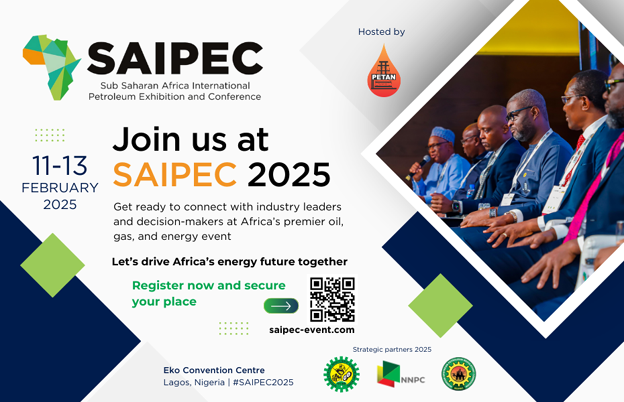
The hugely popular Sub-Saharan Africa International Petroleum Exhibition and Conference (SAIPEC) is back from 11-13 February at the Eko Convention Center in Lagos, Nigeria. SAIPEC, in its ninth edition, known for its groundbreaking discussions, innovative strategies and key opportunities attracts massive interest from all over Africa.
SAIPEC is hosted by the Petroleum Technology Association of Nigeria in strategic partnership with the Nigerian Content Development and Monitoring Board (NCDMB), NNPC Ltd and the Nigerian Upstream Petroleum Regulatory Commission (NUPRC) and over 30 national oil companies and regulators from Sub-Saharan Africa. The conference was originally designed to bolster the growth of independent companies, which it has done quite successfully, as it has evolved in tandem with the increasing participation of these operators, who are now playing an ever-greater role in acquiring and managing strategic assets.
SAIPEC also emphasises developing local content in the industry, which has been part of its foundation since its inception. We spoke to Proscovia Nabbanja, CEO of the Uganda National Oil Company (UNOC), one of the prominent speakers at this year's event.

She says, “I am thrilled to attend SAIPEC 2025 alongside industry leaders, innovators, and stakeholders from across the globe, all of whom share the common goal of advancing Africa’s oil and gas sector. SAIPEC is more than just an event; it is a catalyst for growth, innovation, and collaboration. For the Uganda National Oil Company, SAIPEC offers an incredible opportunity to connect with the global oil and gas community, share experiences with the best, and position Uganda’s oil sector as a key player in Africa’s energy future.”
SAIPEC offers plenty of opportunities to collaborate and connect as it is a hub for networking, and it showcases multi-billion-dollar project opportunities across Africa while offering a vital platform for advancing the continent’s energy sector ambitions.
Nabbanja nods and adds, “The future of Africa’s oil and gas industry lies in our ability to collaborate across borders. Cross-border collaboration in Africa’s oil and gas industry is essential for addressing the challenges of infrastructure development, capacity building, technological advancement, and sustainable practices.”
Cross-border collaboration enables shared infrastructure development, efficiency in resource management, access to capital, regional market expansion and economic growth and development of local industries.
She continues, “Through the sharing of expertise, resources, and technologies, African countries can foster growth in both emerging and mature sectors, ensuring that the oil and gas industry contributes to long-term, sustainable development for the continent. By leveraging African expertise, we can build a future where Africa leads the way in the responsible development of its vast oil and gas resources.”
Nabbanja is involved in the panel on Country Showcases for National Oil Companies, which showcases opportunities across the continent, also shared some news of UNOC’s plans saying, “As a state-owned company, we recently rolled out a new six-year strategy underpinned with a purpose of creating value for generations. Having achieved the final investment decision for the upstream field development and East African Crude Oil Pipeline (EACOP) projects in February 2022 that unlocked value above $10 billion in the sector, we are now focused on executing these projects towards first oil and contributing to social economic transformation for the country and the region.”
She explained, “In the upstream, we continue to jointly work with the Partners to accelerate the developments towards achieving first oil. In addition, we have also put more focus on reserves replacement to ensure the sustainability of production by undertaking exploration and appraisal initiatives for the newly acquired and operated Kasuruban block license and applying for new exploration licences”.
“In the midstream, we aim to accelerate the construction of the crude oil pipeline in partnership with our joint venture partners, fast-track the final investment decision for the refinery and commence construction and expedite the development of the petro-based Kabalega Industrial Park.”
“In the downstream, we continue fulfilling our mandate to import petroleum products to ensure security supply in the country, fast-track the construction of the Kampala Storage Terminal, optimise operations at the Jinja Storage Terminal and expand our downstream portfolio to include LPG and promote clean cooking solutions.”
.
For more information or to book your tickets to SAIPEC click here. https://saipec-event.com
 KEYFACT Energy
KEYFACT Energy